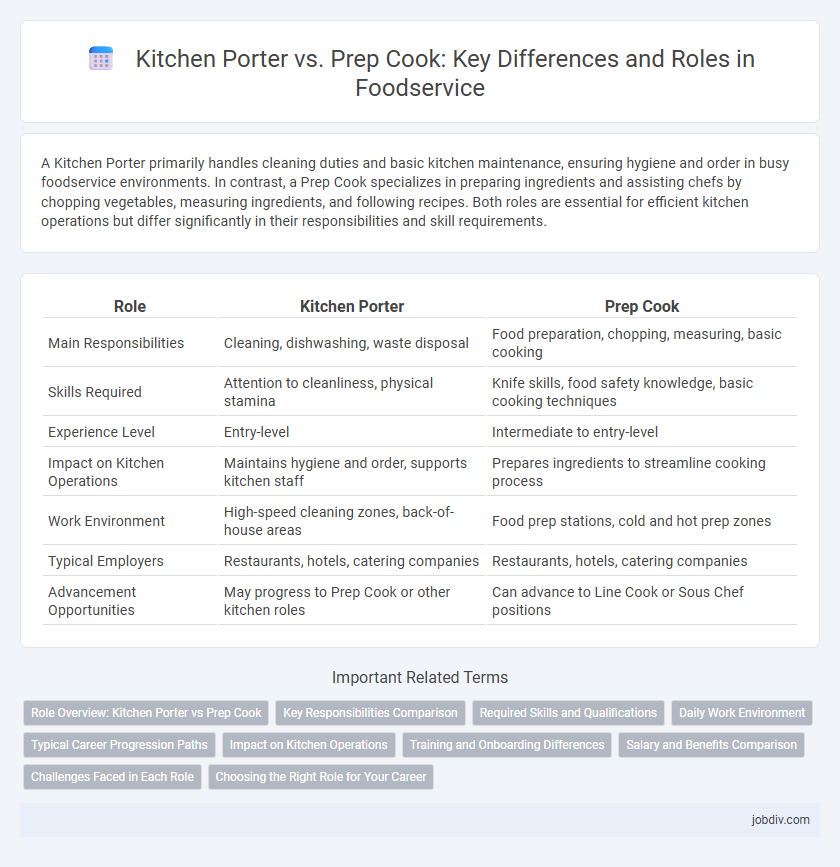A Kitchen Porter primarily handles cleaning duties and basic kitchen maintenance, ensuring hygiene and order in busy foodservice environments. In contrast, a Prep Cook specializes in preparing ingredients and assisting chefs by chopping vegetables, measuring ingredients, and following recipes. Both roles are essential for efficient kitchen operations but differ significantly in their responsibilities and skill requirements.
Table of Comparison
| Role | Kitchen Porter | Prep Cook |
|---|---|---|
| Main Responsibilities | Cleaning, dishwashing, waste disposal | Food preparation, chopping, measuring, basic cooking |
| Skills Required | Attention to cleanliness, physical stamina | Knife skills, food safety knowledge, basic cooking techniques |
| Experience Level | Entry-level | Intermediate to entry-level |
| Impact on Kitchen Operations | Maintains hygiene and order, supports kitchen staff | Prepares ingredients to streamline cooking process |
| Work Environment | High-speed cleaning zones, back-of-house areas | Food prep stations, cold and hot prep zones |
| Typical Employers | Restaurants, hotels, catering companies | Restaurants, hotels, catering companies |
| Advancement Opportunities | May progress to Prep Cook or other kitchen roles | Can advance to Line Cook or Sous Chef positions |
Role Overview: Kitchen Porter vs Prep Cook
A Kitchen Porter primarily handles cleaning duties, dishwashing, and maintaining kitchen hygiene to support smooth kitchen operations. A Prep Cook is responsible for preparing ingredients, such as chopping vegetables and portioning meats, ensuring timely availability of components for cooking. Both roles are essential for operational efficiency, with the Kitchen Porter focused on sanitation and the Prep Cook on ingredient readiness.
Key Responsibilities Comparison
Kitchen Porters handle dishwashing, cleaning, and basic kitchen maintenance, ensuring a sanitary and organized environment. Prep Cooks focus on food preparation tasks such as chopping vegetables, measuring ingredients, and assisting chefs with mise en place. Both roles are essential to kitchen efficiency but differ in their direct contribution to food production and cleanliness.
Required Skills and Qualifications
Kitchen porters require strong organizational skills, physical stamina, and attention to hygiene standards to maintain cleanliness and support kitchen operations. Prep cooks must possess knife skills, knowledge of food safety regulations, and basic cooking techniques to efficiently prepare ingredients and assist chefs. Both roles demand teamwork, reliability, and the ability to work in fast-paced environments, but prep cooks typically need formal culinary training or experience, whereas kitchen porters often require minimal certification.
Daily Work Environment
Kitchen porters typically manage cleaning, dishwashing, and maintaining hygiene standards, ensuring a safe and organized kitchen environment throughout busy service hours. Prep cooks focus on preparing ingredients, chopping vegetables, measuring portions, and assisting chefs with mise en place in a fast-paced, detail-oriented setting. Both roles require stamina and teamwork but differ significantly in their daily tasks and interaction with kitchen operations.
Typical Career Progression Paths
Kitchen porters often start in entry-level roles, focusing on cleaning and basic kitchen tasks, which builds foundational experience in foodservice operations. Prep cooks typically progress by mastering food preparation skills, leading to opportunities as line cooks or sous chefs. Advancing from prep cook to higher culinary positions involves gaining expertise in cooking techniques, kitchen management, and food safety.
Impact on Kitchen Operations
Kitchen porters play a crucial role in maintaining cleanliness and organization, ensuring that cooking stations and equipment are consistently sanitized to prevent cross-contamination and improve workflow efficiency. Prep cooks focus on ingredient preparation, such as chopping vegetables and marinating proteins, directly influencing the speed and accuracy of meal assembly during service. Together, their contributions optimize kitchen operations by reducing downtime and allowing chefs to concentrate on complex culinary tasks.
Training and Onboarding Differences
Kitchen Porters typically undergo brief on-the-job training focused on cleaning, dishwashing, and basic kitchen maintenance, emphasizing efficiency and sanitation protocols. Prep Cooks require more comprehensive onboarding, including instruction on ingredient preparation, knife skills, and cooking techniques to support chefs and ensure food quality. Training for Prep Cooks also includes food safety certifications and familiarity with kitchen equipment, distinguishing their role from the more operational tasks of Kitchen Porters.
Salary and Benefits Comparison
Kitchen porters typically earn an average hourly wage of $11 to $14, with limited benefits mainly including basic health coverage and occasional meal discounts. Prep cooks generally receive higher pay, ranging from $13 to $18 per hour, often accompanied by additional perks such as paid time off, health insurance, and opportunities for advancement within the kitchen hierarchy. Salary differences stem from the varied responsibilities, with prep cooks handling more skilled food preparation tasks that justify greater compensation and benefits.
Challenges Faced in Each Role
Kitchen porters often face the challenge of maintaining cleanliness and organization in high-traffic kitchens while managing time-sensitive tasks like dishwashing and waste disposal. Prep cooks deal with the difficulty of ensuring consistent ingredient preparation under tight deadlines, requiring precision and multitasking to support chefs effectively. Both roles demand physical endurance and adaptability to fast-paced environments, but prep cooks typically confront greater pressure related to food quality and presentation standards.
Choosing the Right Role for Your Career
Choosing between a Kitchen Porter and a Prep Cook depends on your career goals and skill set. A Kitchen Porter handles basic cleaning and maintenance tasks, ideal for entry-level roles with minimal cooking skills, while a Prep Cook requires culinary knowledge to assist chefs in food preparation and cooking processes. Understanding these role distinctions helps foodservice professionals align their job choice with long-term career aspirations in the culinary industry.
Kitchen Porter vs Prep Cook Infographic

 jobdiv.com
jobdiv.com